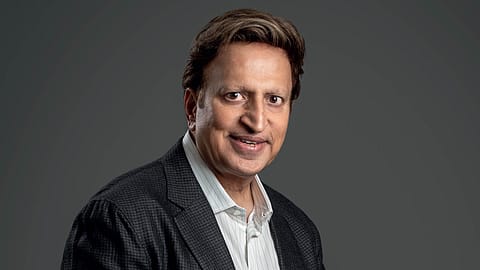Angel One: Mastering Digital Broking
The company sees 42.4% rise in profit as its early bet on digitisation pays off.

This story belongs to the Fortune India Magazine March 2024 issue.
ANGEL ONE encapsulates the story of digitisation of the stock market in India and its cascading effect on financial inclusion of small-town India that followed. Demat accounts grew from less than 3.5 crore in 2018 to about 13.93 crore by end of 2023. On an average, about 1.5 million demat accounts were added every month, and Angel One prepared well in advance for the avalanche of digital natives who entered the market with low-value transactions, high aspirations and expectations of good service. In three years, Angel One’s clients tripled from 65 lakh to 1.94 crore while market share in the Futures & Options segment increased from 3.3% to 27.2%. Angel One stock has delivered 1,100% returns since listing in October 2020, a record by any initial public offer (IPO) in last three years.
Even though Angel One operates in the financial sector, its foundations are rooted in use of technology. Founder Dinesh Thakkar had, in fact, started setting up an IT business and entered the stock market to raise funds. Losses and multiple other stumbling blocks made Thakkar realise the gaps in the market for small investors like himself. Angel was born in 1996.
While the company started out as any other traditional brokerage house, Thakkar was big on innovation. He became the first broker to use a walkie-talkie to share real-time stock prices with customers. The technology was not new but none of the brokers had thought about using it. This philosophy of striving to meet latent gaps in customer experience by leveraging technological tools has remained innate to Angel One since inception. For instance, it was the first to deliver credit notes to customers within a day.
Angel One launched its mobile trading app in 2011 to cater to customers from areas where it was not viable to run physical offices. However, the time was not conducive to realise the full potential of the app as smart-phone penetration was low and cost of data as well as acquiring customers high. So, while the company kept serving customers through the Internet platform as well as branch offices, it was watchful about fast growth in smart-phone penetration and crash in data prices. By FY18, confident that the road to high growth leads to places beyond Tier-II India where mobile app will be the primary customer interface, Angel One took a vital call. The company reasoned that digital may generate lesser revenue in the beginning but it is the path they must take to achieve growth in the long term. So, as it rejigged its offerings for digital customers, it also took a call to shut down all branch offices to focus completely on growing the digital segment rather than generating revenues by serving high-ticket customers, who preferred physical offices.
While the size of transactions by digital clients was not as high, growth in number of customers was rapid. Enabling digital transformation, especially in the pre-pandemic era, required high confidence in one’s consumer insights and digital medium, and Angel seemed to have both. It transformed itself into a purely digital entity in 2019, just in nick of time. A year later, when the pandemic forced brokerages to go digital, it was already reaping the benefits.
“Core to Angel’s growth strategy has been its customer acquisition initiatives wherein it has targeted the Millennial and GenZ population in Tier-II, Tier-III towns and beyond,” says Dinesh Thakkar, founder, Angel One. As a result, the share of Tier-II/III towns and beyond in gross customer additions surged from 85% in Q1 of FY20 to above 89% in Q3 of FY24. The median age of these customers declined from 34 to 29 years. In cash segment, market share increased from 13.7% in Q1 FY20 to 14.9% in Q3 FY24.
Despite being a 28-year-old company, Angel One functions like a start-up when it comes to expanding customer base to achieve revenue targets. While technology has been pivotal to its success, the strength of the business also lies in its strategy of achieving break-even on customer acquisition cost within six months of acquiring a customer, says Thakkar.
More Stories from this Issue
Angel listed only in FY21 despite being operational since 1996. Incidentally, the stock was listed at a discount. Speaking on the IPO and the current status of the stock, Thakkar says, “When it (the IPO) was listed at a discount I, with my CEO, said let us click this picture because this is the last time we will see this price…. I still have that picture.”